Flexible packaging -European Bioplastics Calls for Action to Accelerate Biopolymers Industrial Growth 29-01-2024
Flexible packaging
r-PET Preforms – Ohoskin, ReCarbon collaborate for aesthetic, bio-based composite
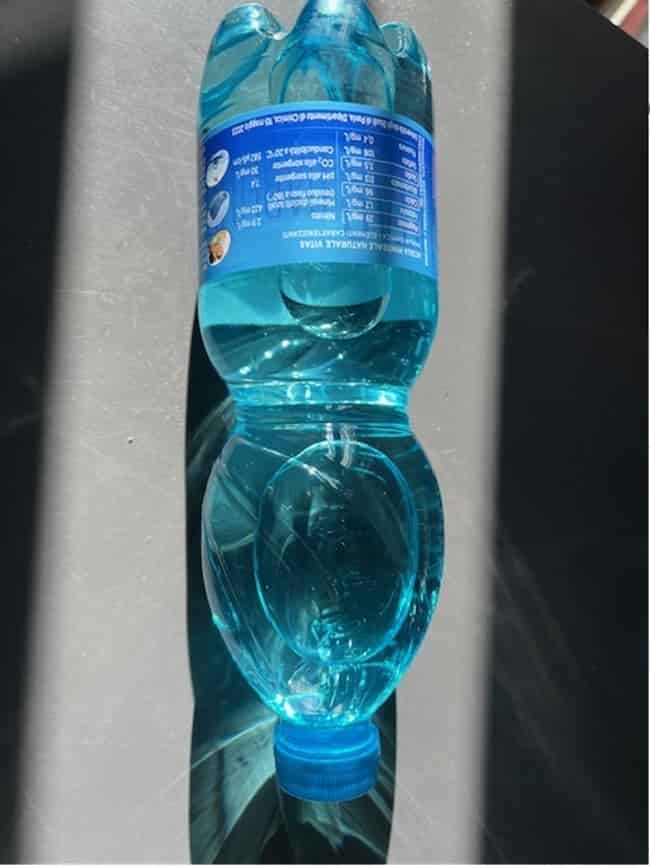
Crude Oil Prices Trend
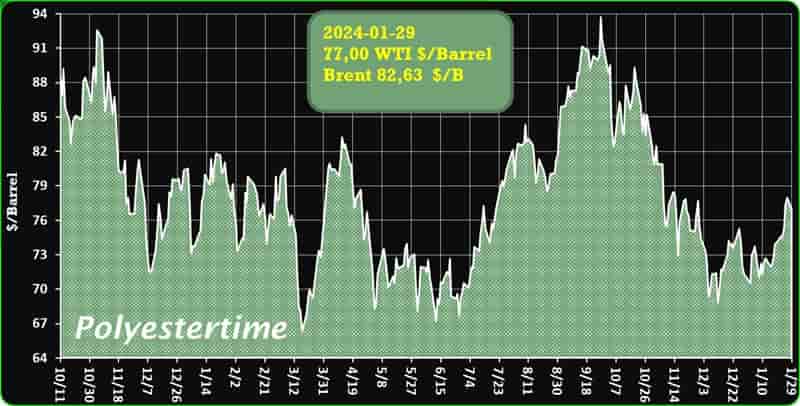
Crude Oil Prices Trend by Polyestertime
European Bioplastics Calls for Action to Accelerate Biopolymers Industrial Growth
European Bioplastics (EUBP) released its Policy Manifesto today, calling on the European Union (EU) to develop a comprehensive Biopolymers Industrial Action Plan to accelerate the growth of the bioplastics industry.
EUBP believes that an actionable EU Bioeconomy Strategy, supporting a strong biopolymers industrial base, should be among the most important elements of the next EU policy cycle EUBP calls on the future Commission and co-legislators to develop a Biopolymers Industrial Action Plan, prioritising the following 6 key points:
- Harmonizing regulations: There is a lack of integration of bioeconomy concepts and priorities within the existing EU regulatory framework, despite a high-level political support for the bioeconomy. Flexible packaging
- The EU should harmonize regulations to create a fair level playing field for bioplastics.
- Incentivizing access to sustainable biomass: The EU needs to strike a balance between bioenergy and biobased sustainable products.
- Enhancing financial support for technological innovation: Scaling up bioplastics manufacturing processes to meet commercial demands can be technically challenging and will require a favourable financial environment for innovation to be able to grow at scale.
- Closing infrastructure gaps and incentivising access to food waste collection: Achieving a circular economy for bioplastics requires robust mechanical, chemical, and organic recycling infrastructure, as well as having access to this infrastructure.Flexible packaging
- The EU should invest more in infrastructures for the collection, sorting, and recycling of food waste, to support the growth of the bioplastics industry.
- Increasing market uptake: Market incentives are needed in Europe to keep the return on public and private investment from being harvested elsewhere. The EU should set up a fair level playing field for biobased, biodegradable, and compostable plastics.
- Increasing consumer awareness: Many consumers remain unaware of the actual environmental benefits of biobased or compostable alternatives. The EU should increase consumer awareness of the benefits of bioplastics to help drive the demand. Flexible packaging

Repsol, a leading energy company, has unveiled its innovative response to the evolving challenges surrounding the recyclability of flexible packaging
Introducing the UltraClean series, this initiative focuses on the production of single-material packaging, tailored to facilitate mechanical recycling and optimized for Machine-Direction Orientation (MDO) film extrusion.
Comprising five grades across High-Density Polyethylene (HDPE), metallocene Linear Low-Density Polyethylene (mLLDPE), and Ethylene Butyl Acrylate (EBA) copolymer, the UltraClean polyethylene line signifies a significant stride toward sustainable packaging solutions. The HDPE grades (UltraClean 110 and 120), metallocene mLLDPE (UltraClean 210 and 220), and EBA-based (UltraClean 310) polymers are meticulously crafted to enhance workability, boasting a draw ratio up to 40% higher than standard alternatives. This superior performance enables applications requiring maximum orientation and distinct mechanical properties. Flexible packaging
As the packaging industry gears up for the impending European regulation mandating complete recyclability of plastic packaging by 2030, Repsol’s UltraClean series emerges as a strategic offering. The company aims to provide customers with solutions aligning with sustainability objectives, particularly in light of the challenges posed by multi-material packaging. The use of MDO technology for single-material packaging production, while not yet ubiquitous, holds promise in meeting the upcoming regulatory requirements.
Antonio Portela, Director of Polyolefins at Repsol, expressed pride in launching one of the most comprehensive ranges to support customers during this crucial phase. Furthermore, the UltraClean range extends its commitment to sustainability with circular, biobased, and biocircular products, reinforcing Repsol’s dedication to circularity and decarbonization in support of their customers’ sustainability initiatives. Flexible packaging
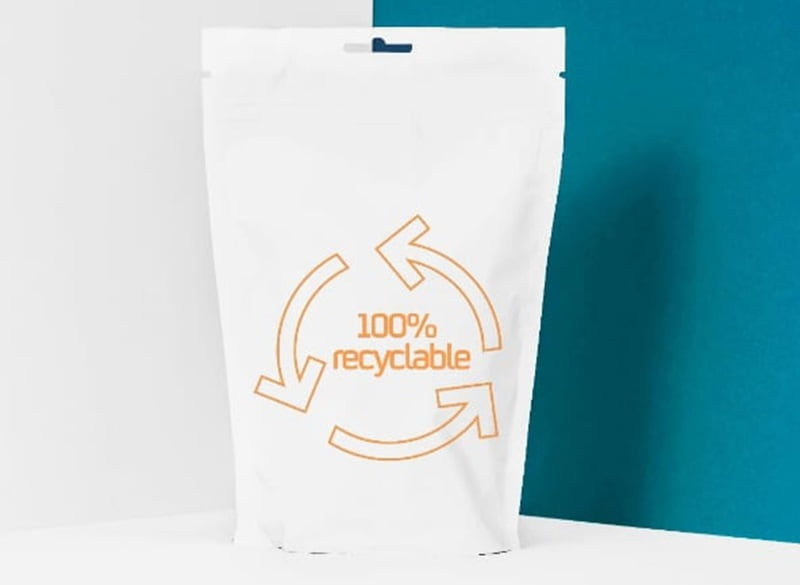
A Netherlands circular economy fund that backs recycling solutions for plastic’s impact on climate change and the environment
Jeroen Kelder spent most of his career in corporate finance and investment, where he financed small and medium-sized companies and invested in key economic sectors such as healthcare and renewable energy. With the increasing focus on circularity, he realised many of the things he had learned could be applied to resource transition and, in particular, to plastics.
“Only a low percentage of plastic is being recycled in Europe,” says Kelder, now managing partner at Infinity Recycling, a fund investing in the circular economy. “We currently lack the solutions to adequately recycle our end-of-life waste, so a lot of it ends up either incinerated or sent to landfill, which is a pity because 7% to 9% of the world’s CO2 comes from plastics. Flexible packaging
Reducing this should be akin to picking low-hanging fruit.”
He wanted to make an impact and he knew that mobilising capital to help companies develop advanced technology and get recycling plants up and running as soon as possible was where he could step in. “It’s disheartening to see innovations and good ideas die because they don’t have the help or funding that they need,” says Kelder. “The world is running out of time.”
The technology to carry out many advanced forms of recycling has often been around for years. But operations have been “sub-scale, too costly and inefficient. And given the disruptive nature of a transition from a centralised, linear economy to a distributed circular economy, the incumbent industry is unlikely to embrace change.” Kelder says. “What the sector needs is independent risk capital and hands-on support.” Flexible packaging
Kelder first approached the European Investment Fund in 2019 to test his investment thesis. Following additional discussions on the strategy and structuring, the EIF in 2023 invested €50m in Infinity Recycling’s Circular Plastics Fund, one of its largest ever investments in a first-time fund, which has enabled it to attain a more optimal size and well on its path to reach its €150 million target size.
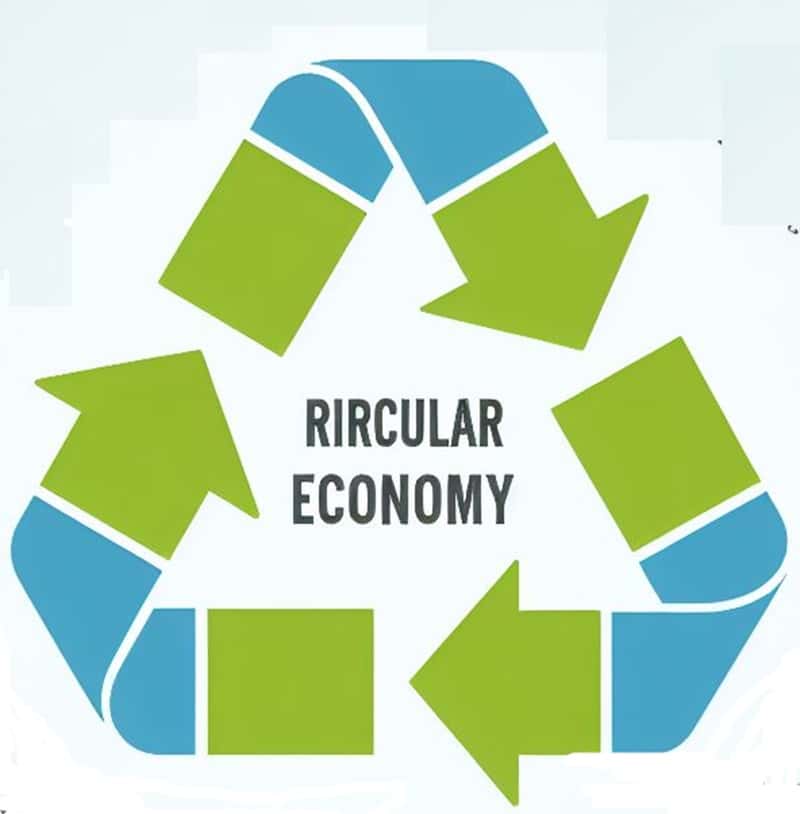
Global circularity rate is falling steadily every year
Over the past five years, the number of discussions, debates, and articles related to the circular economy has almost tripled despite the global circularity rate falling from 9.1% to 7.2%. This is according to the Circularity Gap Report 2024, launched by Circle Economy Foundation today.
In the past five years, humanity consumed a whopping 500 billion tonnes of materials—nearly equal to what was consumed during the entire 20th century. The global circularity rate has fallen steadily from 9.1% in 2018, when Circle Economy Foundation began measuring, to 7.2% in 2023. This means that out of all the materials consumed worldwide, we’re consuming more virgin materials than ever—while the share of secondary materials is declining. Flexible packaging
Accelerating progress toward a circular economy means addressing the root causes of linear impacts and changing the rules of the game to favour circular practices. The Circularity Gap Report 2024 outlines how policy, finance, and employment reforms can reshape global systems to promote circularity.
Ultimately, the report proposes a strategy to break free from flawed economic practices known to be socially and environmentally exploitative. This will require unlocking capital, rolling out bold, contextually appropriate policies and closing the sustainable and circular skills gap.
Policies and legal frameworks can incentivise sustainable and circular practices while penalising harmful, linear ones. Flexible packaging
Wealthy countries could achieve the most impact by adjusting regulations in the construction and manufacturing industries.
Examples include incentivising retrofitting and reusing buildings (and their components and materials), developing certification and warranties for secondary building materials, setting standards for product durability, and strengthening the Right to Repair legislation.
In middle-income countries, fostering circular agriculture and manufacturing will be a top priority.
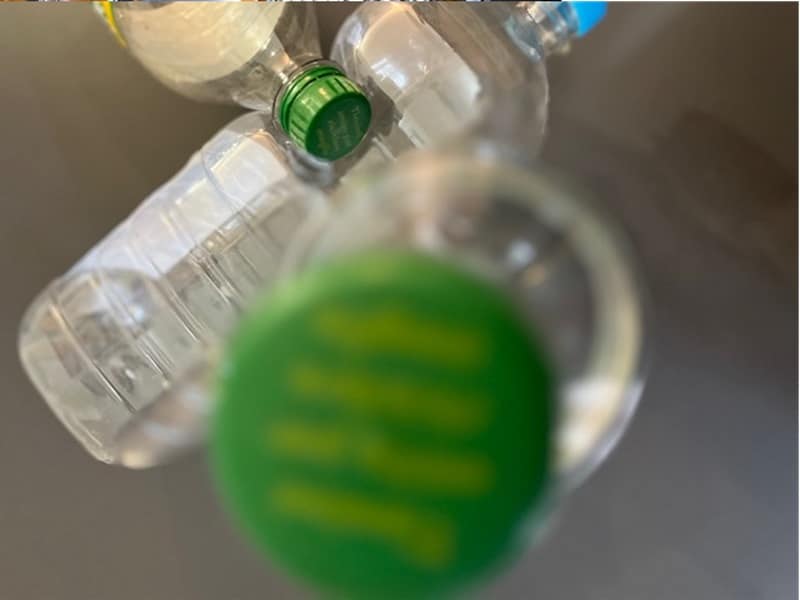
Protein Evolution and Basecamp Research have joined forces in an expanded collaboration to combat the global environmental issue of polyurethane and polyamide (nylon) waste
Leveraging Protein Evolution’s Biopure™ technology, powered by artificial intelligence, which already effectively tackles polyester waste, the collaboration incorporates Basecamp Research’s biodiversity mapping system. This synergy enables the development of enzymes specifically targeting the complex composition of polyurethane and polyamide waste. Flexible packaging
Polyurethane and nylon, constituting 10 percent of global plastic production, present a significant challenge for circularity due to their intricate structures. The collaboration’s primary goal is to design innovative enzymes capable of breaking down these materials into their precursor molecules. This circular approach not only addresses recycling challenges but also contributes to the reduction of the carbon footprint associated with the resulting products, all while maintaining product quality.
Connor Lynn, co-founder of Protein Evolution, expressed enthusiasm about Biopure technology’s practical role in addressing fashion waste and contributing to global decarbonization goals. The strategic partnership also highlights the shared belief in nature as a source of inspiration for solving global challenges, as emphasized by Dr. Glen Gowers, co-founder of Basecamp Research. Flexible packaging
By combining Protein Evolution’s scale-up expertise with Basecamp Research’s biodiversity mapping, the collaboration accelerates the development of enzymatic plastic recycling processes. This strategic partnership not only enhances the capabilities of biological recycling but also aligns with global sustainability goals, drawing attention from leading brands seeking innovative solutions. As the world grapples with the urgency of environmental issues, Protein Evolution and Basecamp Research stand at the forefront of pioneering solutions for a more sustainable future.

Anuga FoodTec: KHS systems combine efficiency with safety
- New rotary InnoPET BloFill ACF-R aseptic block
- Glass-coated PET bottle interiors further developed
- KHS’ range of digital services extended
Sensitive beverages and flexible systems and solutions – these are the topics in focus at the KHS trade show booth for this year’s Anuga FoodTec. With its new InnoPET BloFill ACF-R aseptic block the Dortmund systems supplier wants to set new standards in safety and hygiene when it comes to bottle sterilization. Visitors can also find out all about the latest generation of InnoPET Plasmax barrier technology and the first module in the digital KHS ConnectApp service. Flexible packaging
“Economic success calls for maximum efficiency and availability in all filling and packaging processes. We provide innovative and resource-saving systems and solutions that fully satisfy all aspects of this demand,” says Tobias Wetzel, CSO of KHS. The most recent example of this is the new rotary InnoPET BloFill ACF-R aseptic block that combines the energy-efficient InnoPET Blomax Series V stretch blow molder with the rotary Innofill PET ACF-R filler for the very first time.
Linear fillers can process up to 14,000 bottles per hour. In contrast, the rotary aseptic block has a capacity of up to 36,000 1.0-liter bottles per hour and in the future is even to be available with a top output of 48,000 500-milliliter bottles an hour. The new plant engineering achieves a sterility of log 6 inside the bottles – which is equivalent to a reduction in germs of 99.9999%. Flexible packaging
“Our linear aseptic fillers, also blocked, have long proved themselves in practice in the filling of sensitive beverages into PET bottles, where maximum safety is of the essence. The newly developed rotary aseptic filler in the higher capacity range is thus the next logical step. With this, we also want to set standards regarding the machine’s hygienic properties,” Wetzel promises.
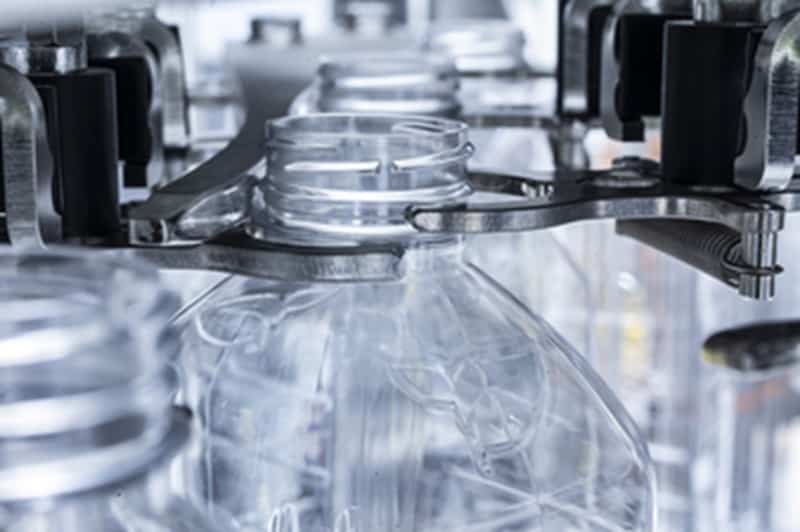
Flexible packaging
